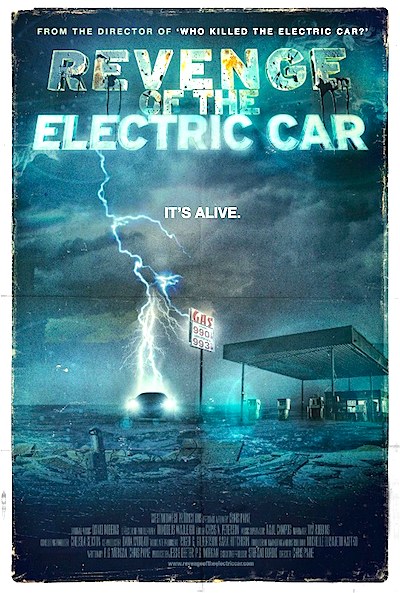By Joe Bendel. In Terminator 2, the villain of the previous film comes back as the hero of the sequel. Such is also the case with Chris Paine’s latest film, except it is a documentary. The freshly reformed protagonist? General Motors. The times just might be changing after all in Paines’ Revenge of the Electric Car, which premiered recently at the 2011 Tribeca Film Festival.
 According to Paine’s Who Killed the Electric Car, despite enthusiastic driver feedback, GM recalled their experimental EV-1, while twisting its mustache and laughing maniacally. Instead, they ramped up production on Hummers. The end, or is it? Fast-forward a few years and meet Bob Lutz, the Vice Chairman of the automotive giant. The car executive’s car executive, Lutz is no tree-hugger. Yet, like Saul on the road to Damascus, Lutz fundamentally changed his mind about the feasibility and desirability of electric cars. Only Lutz has the prestige to put GM back in the electric business and the guts to allow their old nemesis to document it.
According to Paine’s Who Killed the Electric Car, despite enthusiastic driver feedback, GM recalled their experimental EV-1, while twisting its mustache and laughing maniacally. Instead, they ramped up production on Hummers. The end, or is it? Fast-forward a few years and meet Bob Lutz, the Vice Chairman of the automotive giant. The car executive’s car executive, Lutz is no tree-hugger. Yet, like Saul on the road to Damascus, Lutz fundamentally changed his mind about the feasibility and desirability of electric cars. Only Lutz has the prestige to put GM back in the electric business and the guts to allow their old nemesis to document it.
Revenge has other protagonists, like Elon Musk, the tech-centric entrepreneur, who made his fortune with Pay Pal before starting Tesla Motors. Sleek and striking, these sports cars are probably too elite to change the world, but they ought to make electric cool. Unfortunately, Musk has trouble filling customer orders (including Paine’s). As more mass market competition, Nissan chairman Carlos Ghosn has “bet the future” of his company on electric, but that shoe has yet to drop.
It is important to note, none of these ventures are the result of government mandates. Indeed, they are highly speculative ventures that might just short circuit careers and fortunes. To his credit, Paine himself gives due credit to the captains of industry and entrepreneurs of Revenge. Though he retracts nothing from his previous film, it is clear he and pre-government takeover GM made a lasting peace.
Of course, Bob Lutz is a major reason why. Although Paine probably has a naturally affinity for the Silicon Valley-based Musk, Lutz’s curmudgeonly charm dominates the film. The camera loves the cigar chomping old school executive far more than the icy Ghosn or the cerebral Musk. (While Revenge eventually addresses the government bail-out, most of the GM segments deal with Lutz’s early championing of the hitherto underwhelming Volt.)
 The open-minded fairness Paine brings to bear on an industry he formerly excoriated is quite remarkable. Still, the film raises a few questions that remain unanswered. Granted, it would certainly be advantageous to see electric cars displace a number of gas guzzlers, particularly in light of the Obama Administration’s war on domestic off-shore drilling and contentment to import petroleum from hostile governments, like Venezuela. However, is there sufficient infrastructure in place to support them? New York apartment dwellers, for whom alternate-side parking is an eternal fact of life, might be the most inclined to switch to electric cars, but would they be able to charge them? For that matter, electricity is not magically supplied. Could the state of California, which experienced rolling “Gray-Outs” in the early 2000s, handle a significant increase in demand? Paine well might argue the marketplace can respond to these challenges, in which case perhaps Lutz was not the only one to experience a conversion of Biblical proportions.
The open-minded fairness Paine brings to bear on an industry he formerly excoriated is quite remarkable. Still, the film raises a few questions that remain unanswered. Granted, it would certainly be advantageous to see electric cars displace a number of gas guzzlers, particularly in light of the Obama Administration’s war on domestic off-shore drilling and contentment to import petroleum from hostile governments, like Venezuela. However, is there sufficient infrastructure in place to support them? New York apartment dwellers, for whom alternate-side parking is an eternal fact of life, might be the most inclined to switch to electric cars, but would they be able to charge them? For that matter, electricity is not magically supplied. Could the state of California, which experienced rolling “Gray-Outs” in the early 2000s, handle a significant increase in demand? Paine well might argue the marketplace can respond to these challenges, in which case perhaps Lutz was not the only one to experience a conversion of Biblical proportions.
In a pleasant surprise, Revenge is probably the most favorable depiction of corporate and entrepreneurial America seen in a documentary since who knows when? Again, Paine deserves his just due. As a result, he will probably spread the electric car gospel to previously unreceptive audiences. He certainly makes a star of Lutz (so it is a shame the current administration does not want him involved in “Government Motors”). Informative and engaging, Revenge screens again at the 2011 Tribeca Film Festival Wednesday (4/27) and next Saturday (4/30).
Posted on April 26th, 2011 at 10:39am.
“It is important to note, none of these ventures are the result of government mandates.”
In a narrow sense true but Tesla has received lots of government support including a $465 million dollar loan commitment. Let us not talk about the only reason Bub Lutz still has a job in GM is because of the bailout of GM.